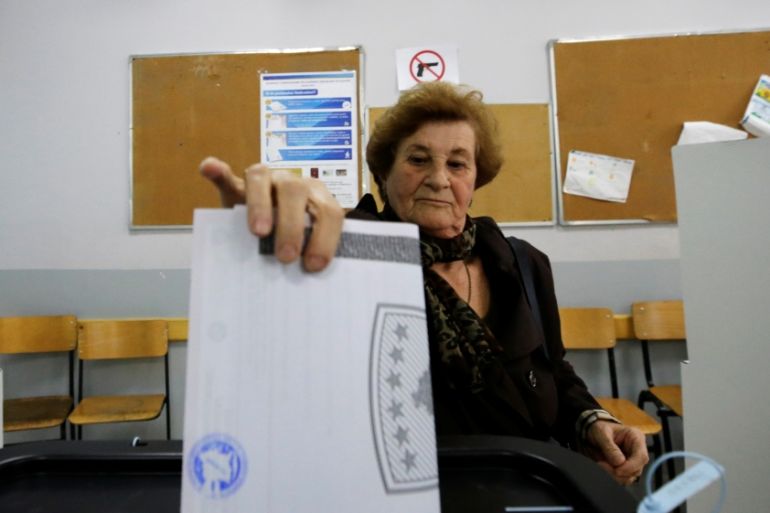Kosovo votes amid pressure to restart peace talks with Serbia
Winner likely to face pressure to renew dialogue with Serbia, which continues to reject Kosovo’s independence.

Polls have closed in Kosovo‘s snap parliamentary election, called after Prime Minister Ramush Haradinaj resigned in July amid war crimes allegations.
The main issues for the country’s 1.9 million eligible voters in Sunday’s poll included tackling corruption and a peace deal with Serbia – which would pave the way for a United Nations membership.
Keep reading
list of 4 itemsBehind India’s Manipur conflict: A tale of drugs, armed groups and politics
Solomon Islands prepares for ‘most important election since independence’
Six takeaways from first day of Trump’s New York hush money criminal trial
The winner is likely to face heavy pressure from the West to renew dialogue with Belgrade, which still rejects the independence its former province declared in 2008.
According to an exit poll released after polls closed, Kosovo’s two opposition parties – Vetevendosje and the Democratic League of Kosovo (LDK) – were each set to get 30 percent of the vote.
The Democratic Party of Kosovo (PDK) was in third place with 22 percent of the vote.
The vote was overseen by more than 34,000 monitors – including 100 from the European Union.
Kosovo-Serbia talks stalemate
Analyst Krenar Shala expects the talks with Serbia to dominate the agenda of any new government.
“It is clear that the future government will focus almost its entire energy on the dialogue with Serbia and very little on the issues discussed with the citizens during this election campaign,” he said.
Kosovo needs Serbia and its allies Russia and China to accept its statehood so it can get a seat at the UN.
Serbia is also under pressure to make peace so it can move forward with its EU accession process.
In 2013, Pristina and Belgrade agreed to an EU-mediated dialogue. However, talks have been at a standstill for nearly two years, with frequent diplomatic provocations souring efforts to build goodwill.
The United States and the EU see tensions between Serbia and Kosovo as a major threat to regional stability and are pushing for a normalisation of relations.
On Thursday, US President Donald Trump appointed Richard Grenell, the US ambassador to Germany, as special envoy to try to inject new energy into the talks between Belgrade and Pristina.
Tariff move ‘amateur’
One of the core obstacles to resuming talks is the 100 percent tariff that Haradinaj slapped on Serbian goods a year ago.
Having resisted heavy Western pressure to remove the tariff, the former commander is hoping voters will reward his tough stance by re-electing him.
All the other top candidates, however, have shown a willingness to reconsider the tariff for the sake of dialogue.
Kadri Veseli, leader of the Democratic Party of Kosovo, which was part of the outgoing coalition with now-rival Haradinaj, has condemned the tariff move as “amateur”, and said he would honour Washington’s calls to remove it.
Opposition party candidates Vjosa Osmani, from the centre-right Democratic League of Kosovo, and Albin Kurti, from the left-wing and nationalist Vetevendosje, also seem willing to lift the trade barrier and to resume talks.
The pair has also left open the possibility of joining forces after the polls – an alliance that could remove the so-called “war parties”.
However, with no camp expected to take home an absolute majority, coalition talks could drag on for weeks.